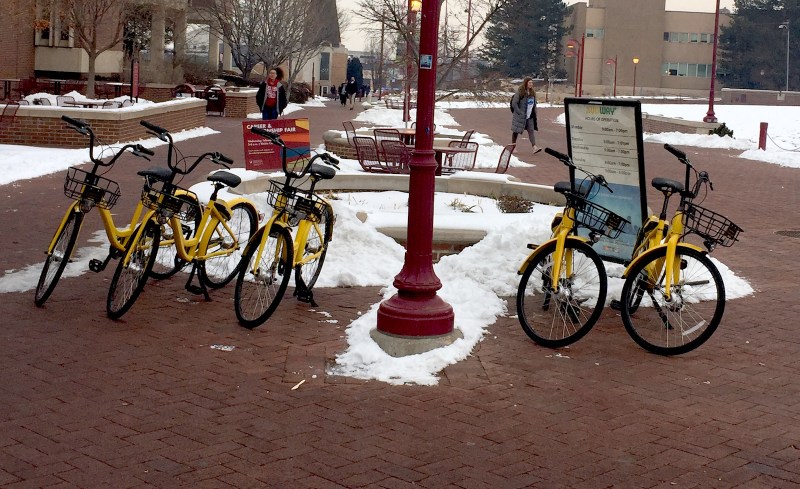Dockless Bike-Share Is Coming to Denver Streets Through a DU Pilot
One company, ofo, will operate the service, which will be limited to University of Denver students and faculty.

Denver Public Works will allow dockless bike-share company ofo to operate on city streets, with several caveats, as part of a one-year University of Denver pilot that’s only open to students and faculty. Expect to see the bright yellow bikes around the DU campus and throughout southwest Denver in late March or early April.
Dockless bike-share lets riders use bikes through an app without being tethered to stations. Since DU lost B-cycle, college reps hope the pilot lets people bike to, from, and around campus — particularly to and from the light rail station, which is more than a half-mile from many classrooms and offices. The pilot will include 200 bikes.

The boundaries of the pilot zone will be limited to about 12 square miles around DU, overlapping with just one B-cycle station. Unlike Aurora, which has permitted bike-share companies to operate broadly, Denver’s version of dockless “won’t be a free-for-all,” said Chad King, director of sustainability for DU.
For starters, only people with a DU email address can sign up. Ofo will have to return bikes parked outside the pilot area (outlined in black on the map) to campus within 24 hours, King said. The company will have two hours to move any bike blocking the right of way for people walking or otherwise parked illegally. Lastly, if a bike sits idle for 48 hours, ofo will have to shuffle it back to campus.
“The university will retain the right to end the pilot early if the contract parameters are not being adequately met,” King wrote in an email.
DPW officials will be watching closely to see whether the model makes sense on a citywide basis. Companies want into the Denver market, but the streets department isn’t sold.
“We’re interested to understand user behavior, operator responsiveness, and the hard and soft costs associated with dockless,” said Cindy Patton, DPW parking and mobility manager. The city is “excited to finalize the terms” with ofo and DU, she said.
Nationally, free-roaming bike-share has shown potential to expand bike access to people beyond the typically white, affluent neighborhoods where traditional bike-share stations are common. Despite initial success in cities like Seattle and Washington, D.C., the model still faces serious questions: Can companies keep paths clear for people with disabilities? Does a transportation service backed by venture capitalists have staying power? Will companies share data with cities transparently, or will they fudge numbers to look better, like ofo did in Aurora?
Ofo will share the total number of users, repeat users, number of trips, trip routes, parking compliance, and maintenance logs with DU and the city, according to King.
“Right now with the contract that we’re drafting, we feel confident that we’ll be getting all the data that we want,” King said. “We need the data for the pilot, from our side, to see if it’s successful. We’ll be sharing data with the city as they’re interested in seeing if this is successful.”
To see if the pilot’s working, DU and DPW will examine how intensely people use the bikes by measuring the number of rides per bike per day. DU will track changes to how people get around in its annual survey, King said, and will work with Transportation Solutions to gain feedback from surrounding neighborhoods.


